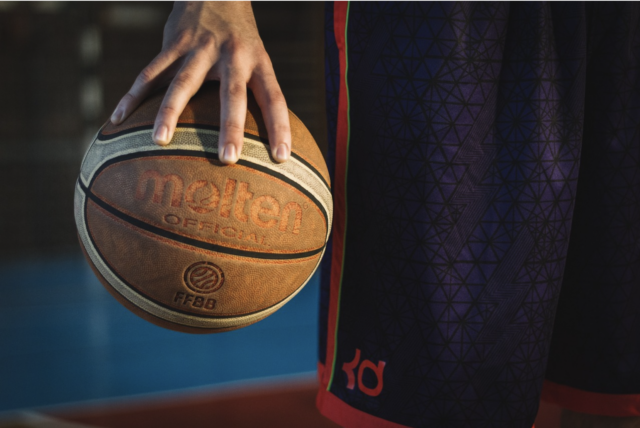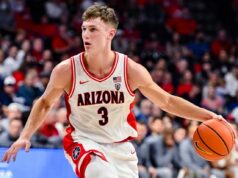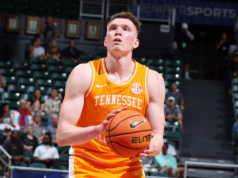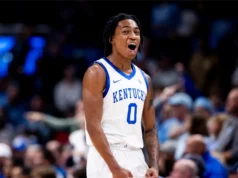Countless college basketball players also burst onto the scene, stand out, and break out into stardom. They’re often called “generational, can’t-miss” NBA prospects or the league’s “prep-to-pro generation.”
However, when they reach the pro game, many NCAA rising stars aren’t able to become the best and have their careers fall disappointingly flat. Even worse, they barely make an imprint in the NBA.
Five Reasons Why NCAA Rising Stars Flop
Talent and Experience Gap
The National Basketball Association (NBA) is totally on a different level. It’s a fully professional league where the finest basketball players in the world compete against each other. While it can be a good training ground for many rising stars, it’s hard to expect they’ll win against more experienced and professional players.
Overall, the NBA players are much more physically and mentally developed due to the increased level of competition, challenge, and experience they gained during their pro basketball career. College basketball players, in contrast, are still developing not only in terms of physical growth and maturity but also talent and experience.
Physical Differences
The physicality is simply stronger in the pro game than in college basketball. As mentioned, the NBA is the playing ground of professionals, who are far physically bigger and stronger than amateurs. More often than not, rising stars yet amateur players are pushed around by veteran players who know what they’re doing when it comes to defending and fouling.
Different In-Game Styles
NBA has a different in-game style from college basketball. To begin with, NBA players often play the game with little to no assistance from others, while college basketball players rely heavily on their coaches and teammates.
Defense is another major difference between pro and college basketball. The NBA is often a man-to-man league with zone defense with many complicated rules. College basketball, however, has no such complications.
Instead, college basketball has a whole host of varieties of zone defense, with a few becoming trademarks of some teams. That’s why when these college players play in the pro game, they either can’t defend well because they aren’t used to man-to-man defense or are used to playing a particular zone defense.
The dimension of their courts, spanning from the distance between the foul line and the backboard to the height of the baskets, is different as well. The college basketball court is relatively smaller. Its three-pointer line is 19.9 inches, which is closer to the basket, and the paint (i.e., the width of the lane) is 12 feet. Conversely, in the NBA, the three-pointer line is 23.9 inches, while its paint is 16 feet.
Moreover, college basketball has fewer refs and a shorter shot clock. That means players can have more time to think during the game and avoid being aggressive on offense. However, this doesn’t only make games very low-scoring but also makes them inflexible in the pro game.
Schedule Differences
The NBA schedule has a much more grueling season, making it even more physically demanding. In a season, the pro game crams 82 games into six months, while college basketball only has 30-35 games in a span of four months.
On top of that, NBA players have to spend long hours traveling from one city or state to another for their matches, even during their rest days. College basketball teams, on the other hand, tend to have shorter travel distances between games, usually only within their cities.
This is why a team’s rest plays a role in FanDuel NBA Odds and other sportsbooks. A well-rested NBA team is likely to outperform a less-rested team, so monitoring their fatigue is logically sound. Doing so certainly brings profits if handicapped correctly.
Bad Attitude
The player’s personality matters as well. A bad personality, in particular, affects their overall poor performance. For example, dishonest or bad-tempered players often break game rules and the team’s strategy, which may contribute to the team’s loss.
However, a recent study found that there are no links between a basketball player’s traits and the number of fouls they will likely commit. These qualities include emotionality, honesty, extraversion, and openness to experience.
Still, short-fused players tend to be aggressive in the game. They often disregard other players’ safety and, worse, cause physical injuries “intentionally.” Although many players of the same accept this aggressiveness, others don’t, which often causes a rift within a team.
Final Thoughts
Watching college basketball gives you an idea of the next NBA superstars. However, many end up in the typical list of draft busts. Some opt never to bring their skills to the pros, while many fail to make a mark in the pro leagues.
Although these NCAA rising stars lit up the stadium with flashy dunks, buzzer-beaters, and nail-biting moments, the differences between college and pro basketball, alongside the gap between experience and maturity, make NCAA stars flop in the NBA.






